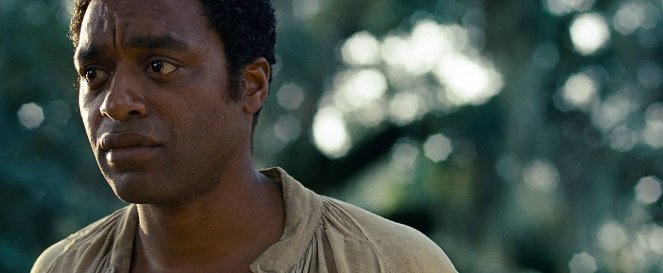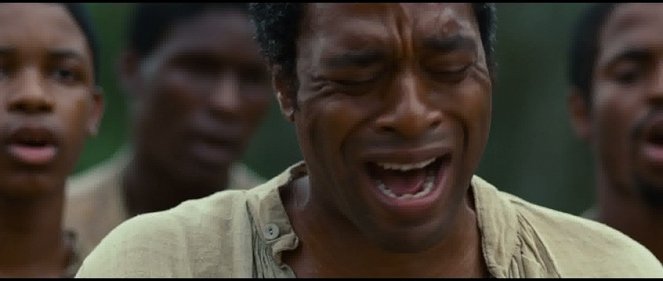Director:
Steve McQueenGuión:
John RidleyCámara:
Sean BobbittMúsica:
Hans ZimmerReparto:
Chiwetel Ejiofor, Michael Fassbender, Lupita Nyong'o, Benedict Cumberbatch, Sarah Paulson, Paul Dano, Brad Pitt, Paul Giamatti, Michael Kenneth Williams (más)Sinopsis(1)
En los años previos a la Guerra Civil de Estados Unidos, Solomon Northup (Chiwetel Ejiofor), un hombre negro libre que vive en Nueva York, es secuestrado y vendido como esclavo. Solomon deberá luchar no sólo por continuar vivo sino también por preservar su dignidad frente a la crueldad de su amo (Michael Fassbender). Su esperanza, alimentada por inesperados gestos de amabilidad y ayuda, no le abandonará a lo largo de su odisea de doce años. La oportunidad de Solomon de conocer a un abolicionista canadiense (Brad Pitt) cambiará su vida para siempre. (DeAPlaneta)
(más)Videos (36)
Reseñas (16)
Django al revés. Una odisea al estado emocional y psíquico de la pérdida de la dignidad y la humillación absoluta captada con calma en las tomas de gran angular de la Luisiana pantanosa y con la fina música de Hans Zimmer (aquí funcionarían mejor las cuerdas de Williams). La plantilla narrativa de Hollywood poco imaginativa pero «segura» mantiene innecesariamente la película bajo control y la distancia de la peculiaridad autoral que esperábamos del director McQueen. Y cometen el error nada pequeño de contratar al simpático Fassbender para que interprete al clave y más complejo personaje sádico de Epps, lleno de maldad y debilidad. Incluso Benedict Cumberbatch hubiera quedado mejor en esta paráfrasis del personaje Amon Goeth de La lista de Schindler. El último tercio de la película, graduado por la flagelación final, podría haberse convertido en el momento cinematográfico más fuerte del año si el supremo mal humano hubiera sido interpretado por alguien más creíble.
()
A drama with two storylines, an omniscient narrator and clearly defined objective and solidly cohesive dramaturgy? Dialogue handled predominantly with the shot/countershot technique? Softening of violent moments though precise editing? Not this time. Though 12 Years a Slave has been reproached for its conservative classicism, what McQueen adopts from the classic Hollywood style is especially an interest in the human body, which could also be described as an expression of his creative signature. Faithfulness to the original book even at the cost of breaking up the narrative into a number of episodes that are not firmly interconnected, and when one isn’t conditioned by another, was one of the many wise filmmaking choices that resulted in a lacerating cinematic account of the atrocities that whites perpetrated against a race that they considered to be inferior. McQueen’s mastery consists in the way he manages to avoid twisting historical facts in order for them to fit into the bigger story (like Spielberg in Amistad and Lincoln), while providing an extremely intense viewing experience. Thanks to the suppression of dramatic tension and the numerous static shots, the film seems like a series of consecutively arranged images that slowly burrow into the viewer’s memory thanks to the spiral repetition of certain situations and shot compositions. True to his background as a video artist, McQueen does not recount history or turn it into a drama, but instead lets it come alive as if it were happening right now. The protagonist’s hardships are therefore not viewed from the outside. We experience them together with Solomon, through his body, eyes and ears. Throughout the film, we know just as little as he does (for example, we never see the whole ship by which he is transported to New Orleans) and, despite the telling title of the film, we have just as few reasons to believe that he can emerge victorious from the uneven struggle for his own identity. The reduction of life to mere survival and the transformation of a person into an animal (or rather property) are highlighted by the loss of consciousness of spatial and temporal contexts, as we are not informed about the time and place of the events, with the exception of the introduction. In combination with the complete lack of moments providing relief, the abundance of unpleasant shots and images, from which the camera never turns away (the unpleasant shots are also the longest) makes 12 Years a Slave one of the most audacious films of last year. 90%
()
I’m sort of thinking about the US history. It wasn’t very joyous. And then I think about ours. But I’ll return to the US history and I can only say that people were real bastards in the past. I’m not saying that they’re not bastards nowadays, but what happened on the US territory during its colonization is just unparalleled. The land bought by the blood of Native Americans and then subsequently African Americans that the white men have brought in… that’s not exactly something you can brag about nowadays. And a very interesting British director Steve McQueen introduced one such chapter into a story that made me sick throughout the entirety of the movie. I almost didn’t make it till the ending. And I believe I can take a whole deal when it comes to movies now. But I guess I can’t, I haven’t seen a movie this heavy in a long time. Some of the scenes reeked of absolute despair, loss and sadness from each day spent on a cotton field. But the director filmed it really well. I won’t ever get some of the scenes from my mind. And not only because there were insane things happening, but also because the director has purposely filmed them to be lengthy, sometimes even silent. The ending itself is all-telling. And those actors? I don’t need to take a long time to talk about them. They all left such an impression on me. Not only the main African American ones, but also those portraying secondary characters, who had a whole array of famous names.
()
Just like Zimmer recycles his music, McQueen here has recycled all of the movies about black slaves that have existed to this day. Honestly, this film has nothing unexpected or otherwise interesting. Ejiofor becomes a slave, is a slave for twelve years and then it’s no longer a slave. The end. I also had some problem with the time frame, it didn’t feel at all like it was twelve years, I actually felt that the story could’ve taken place in four years, or even less. But the execution is very good, without any excessive moralising or pathetic bullshit, so a pretty decent Oscar winner. BTW, the best performance is Fassbender’s, hands down, while Pitt surprisingly manages to annoy even in his short, almost cameo appearance.
()
I was afraid of self-poignant historical frescoes about a cohesive black community and ugly southern slaveholders, but I got a surprisingly bright and complex story of a man who will perhaps too quickly acquire a forced identity and live his 12 years not in chains, but in separation (from his family, but also from the "community" of Negro slaves). Like Tarantino a year ago, McQueen ticks off too-simple boxes and pleasing catharsis. Although the screenplay sometimes casts unnecessarily large words under his feet, but the narrative through images, the emphasis on ambiguous "looking" into the face of the protagonist and his companions, and the inner stratification of individual Lords keep him close to his central theme - lack of freedom, which is not the result of specific enslavement, but rather existence itself. In the end, we can come to the surprising discovery that more than anything, 12 Years a Slave is a film about the acceptance of someone else's identity and the traumatic loss of oneself. Hence the often mentioned passivity of the main character, which is in fact an essential part of his choice to survive even through the greatest compromises. More like Frantz Fanon than Steven Spielberg, the film is masterful and strong in the best moments, despite its imbalance. In the others, perhaps safely approaching conventions, it is still at least fascinating and worth thinking about. [85%]
()
Galería (74)
Foto © Fox Searchlight Pictures



Anuncio